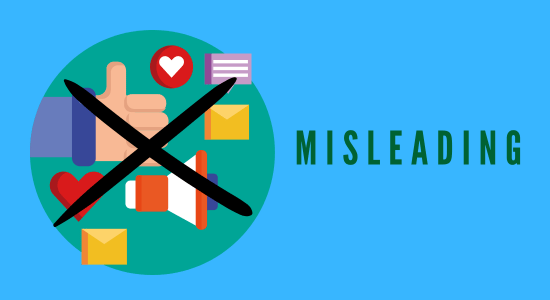A lot of niche marketers casually call themselves an "affiliate marketer" while others try to avoid the word affiliate and simply refer to themselves as "a blogger" instead. If you call yourself a "niche marketer", people generally don't know what you actually do. Whereas if you ask your friends what they think "affiliate marketing" means, most of them know roughly what it is about - promoting something on behalf of a seller in exchange for a commission.

Did You Know?
- Trust in Affiliate Recommendations: Approximately 49% of consumers say they trust recommendations from influencers and affiliate marketers when making purchase decisions.
- Consumer Preference for Authenticity: Over 90% of consumers indicate that authenticity is key in deciding which brands they like and support, impacting how they view affiliate marketers who promote products.
- Influence on Purchasing Decisions: Around 40% of consumers have purchased a product online after seeing it used by an influencer on social media, highlighting the impact of affiliate marketing.
- Affiliate Marketing Spend: Businesses are projected to spend $8.2 billion on affiliate marketing in the U.S. alone by 2022, reflecting its value to advertisers and potential for consumers.
- Email Marketing Effectiveness: Email marketing, a common affiliate marketing strategy, has a median ROI of 122%, which can influence perceptions of affiliate marketing's effectiveness.
- Mobile Commerce: Over 70% of affiliate marketing transactions happen on a mobile device, suggesting that mobile-friendly affiliate content is crucial for positive consumer engagement.
- Consumer Awareness: Only about 38% of consumers say they are aware of affiliate marketing and understand how it works, indicating a gap in understanding that can affect perceptions.
Just like "lawyers" are the most respected and the least trusted, there are many good niche affiliate marketers and also as many scam affiliate marketers.
The term affiliate marketing is not generally accepted well by network publishers. Email service providers to start with (as I have previously mentioned "Mailchimp and Affiliate Marketing"). Many online social "enhancement mediums" seem to hate the phrase. For instance CoPromote, who provides social media post sharing service, randomly disapproves any posts that appear to indicate affiliates.
Over-Promotion and Spamming
One big reason people are turning their backs on affiliate marketing is the spammy way some marketers promote products. We've all seen it – social media posts, blogs, and emails packed with too many links and an aggressive sales pitch. It feels like everywhere you turn, someone's trying to sell you something.
This over-promotion makes people wary and tired. When affiliate links pop up in every other sentence, it's a turn-off, and it can make the whole thing feel like a relentless sales pitch rather than helpful information.
Scammers' Affiliates Become Spammers
The crucified area is often defined by these famous phrases; "Get Rich Quick" and "6-Figure so and so". And also MLM.
Affiliate marketing has a short history with less than 30 years since the concept was first found. It has blossomed in every direction since, therefore there are many areas yet to be regulated. Affiliate marketers have less responsibility as they own little assets to look after and have no customer care to worry about.
Let's face it: the idea of making a ton of money quickly and easily is pretty tempting. That's exactly what 'get rich quick' schemes promise. They often come with flashy titles like "Earn 6 Figures in 6 Months!" The people who create these systems know just how to pull you in. They use big promises and show off lavish lifestyles that make you think, "Hey, if they can do it, so can I!"
How I "Finally" Make Over $7,000 Monthly Income
"The most valuable thing I've ever done!"
The Role of Affiliates in Spreading the Word
Now, the creators of these systems often have affiliates who spread the word about their programs. These affiliates get a cut of the profits for every person they bring in. And let's just say, they can be pretty determined.
They'll post everywhere: social media, forums, you name it. Their goal? To get as many people as they can to sign up. They might not always stick to the truth, either. They're focused on selling, sometimes bending facts or making promises that the program can't really keep.
Did You Know?
- Ad Blocking: With 25.8% of internet users employing ad blockers, affiliate marketing, often seen as less intrusive, may be viewed more favorably for product discovery.
- Value of Reviews: 85% of consumers seek out external reviews before making a purchase, many of which are provided by affiliate marketers, showcasing their role in the decision-making process.
- Affiliate Marketers and Consumer Trust: A study found that 16% of consumers don’t trust recommendations from affiliate marketers, suggesting a trust barrier that affiliates must work to overcome.
- Influencer Impact: 70% of teenage YouTube subscribers trust influencer opinions over traditional celebrities, indicating a potential positive perception of affiliate marketers within younger demographics.
- Transparency in Marketing: 54% of consumers would like to see more transparency from influencers or bloggers about who is sponsoring them, affecting perceptions of authenticity and trust.
- Performance-Based Marketing Preference: 80% of brands utilize affiliate marketing, which means a significant portion of online marketing is performance-based, potentially increasing its credibility among consumers.
- Preference for Detailed Content: Consumers prefer detailed content over simple advertisements, with affiliate marketers who provide comprehensive reviews or tutorials seen more positively.
The Spamming Game
This is where the spamming goes wild. These affiliates will try any platform they can to promote these 'get rich' schemes. Ever seen those random comments on social media posts promoting some money-making system? That's them. They'll flood your inbox, comment sections, and even direct messages with their promotions.
They'd do whatever it takes to get their message out there, regardless of how annoying it can be for the rest of us.
A Game of Cat and Mouse
These affiliates are used to being kicked off platforms. It's just part of the game for them. They get banned from one place, they pop up in another. It's like a never-ending game of cat and mouse. They're quick to create new accounts and start the whole process over again. For them, every new account is a fresh start, a new chance to promote these schemes.
Lack of Authenticity and Trust
Here's another thing: authenticity, or rather, the lack of it. All this spamming and false information has a big impact on how we trust what we see online. It's getting harder to tell what's real and what's just another scheme. This constant bombardment of 'too good to be true' offers makes us skeptical.
We start to question the legitimacy of even genuine online opportunities. In the end, the actions of these persistent affiliates can lead to a lot of mistrust in the online world.
When affiliate marketers don't genuinely believe in the products they're promoting, it shows. People are smart; they can tell when someone's heart isn't in it and they're just after a quick buck. This lack of authenticity erodes trust.
If an affiliate marketer promotes anything and everything, regardless of quality or relevance, why would people trust their recommendations? Genuine endorsements are rare, and when they're missing, skepticism rises.
Did You Know?
- Skepticism Towards Affiliate Marketing: Some studies suggest a skepticism towards affiliate marketing exists, with concerns about bias due to the commission-based model.
- Growing Industry: The affiliate marketing industry is growing, with a 10% annual growth rate, demonstrating its increasing importance in digital marketing strategies.
- Influence on B2B Decision Makers: 75% of B2B decision-makers say they are influenced by information found on social media, including content shared by affiliate marketers.
- Return on Investment (ROI): Affiliate marketing has one of the highest ROIs of any online marketing strategy, with a 12:1 return on average, which can enhance its perception as an effective marketing channel.
- Perception of Overpromotion: There is a concern among consumers about overpromotion or irrelevant product recommendations, which can negatively impact how affiliate marketers are viewed.
- Demand for Authentic Experiences: Consumers demand authentic shopping experiences, with 65% of them saying they feel overwhelmed by too much branded content, impacting how affiliate marketing content is consumed and perceived.
Misleading Claims and Unrealistic Expectations
Some affiliate marketers make wild claims about the products they're promoting. "Lose 20 pounds in a week," "Earn six figures while you sleep," – sound familiar? These exaggerated claims set unrealistic expectations.
And when these promises fall flat, which they often do, it leaves a bad taste. People get burned by these false promises and become cautious of anything that smells remotely like affiliate marketing.
Quality of Content Takes a Backseat
Affiliate marketing can sometimes lead to a drop in content quality. Ever read an article that feels like it was written just to shove affiliate links at you? It's pretty clear when the content is secondary to the product promotion.
This shift away from quality, helpful content to a focus solely on sales can push readers away. They came for the content, not a sales pitch, and when they don't get what they came for, they leave.
Ad Blockers and Privacy Concerns
In this era where privacy is a big deal, people are using ad blockers more than ever. These tools not only block traditional ads but can also interfere with affiliate links. The rise in privacy concerns means people are more cautious about what they click on. If they sense that a link is part of an affiliate program, they might avoid it altogether, not wanting to be part of a tracking system or to inadvertently support a marketing strategy they don't trust.
“Affiliate Marketing” Is A Crucified Phrase
So affiliate marketing has its hurdles. From over-promotion and lack of trust to misleading claims and a drop in content quality, it's easy to see why some people are giving it a wide berth. Plus, with the rise of privacy concerns and ad blockers, even well-meaning affiliate marketing efforts can face challenges.
So if you think you're a "good affiliate", searching for the best interest for your readers, problem solver and you exist to help others, telling others you're in affiliate marketing can cause a confusion. You're an online marketer (covers all)...blogger (can be as broad as a designer or "I have a job").....just a suggestion.
This hidden knowledge used by the elites will let you generate wealth and prosperity





Hey Raymundo, I’ve had problems with CoPromote several times and found their behaviors unfair. I’ve seen lots of shared posts about “6 figure get rich” and they’ve banned a few of my posts because they only had a link with hashtag words. My posts are nothing to do with affiliate marketing.
Hi Sam, thanks for sharing your experience. I think CoPromote offers a great service, to let us share similar posts and I actually find a lot of interesting websites through CoPromote, which I would never have done if not for CoPromote. They offer free service as well as pro/premium service and like you say, I have a big question over their filtering system I wouldn’t go premium nor recommend anyone to go premium. It can be a challenge to tell others that you are a “legitimate affiliate” within a limited space.